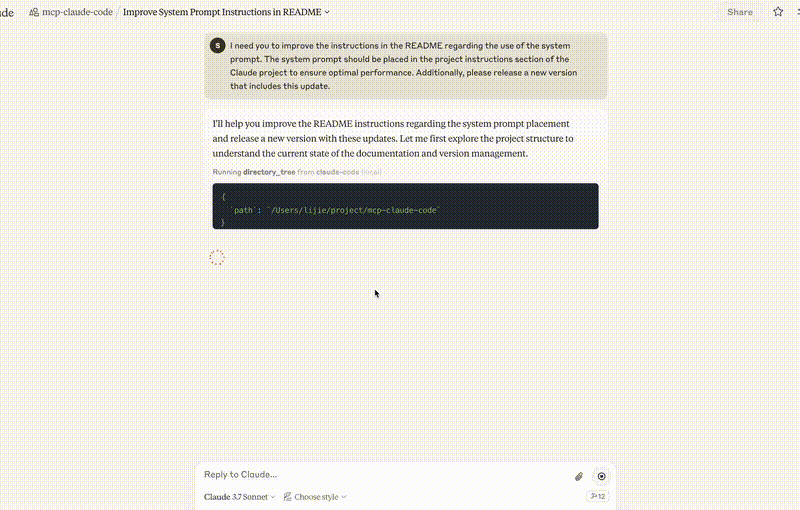The Hanzo MCP server is a universal development tool enabling Claude to interact with projects through advanced code understanding, modification, and management capabilities.
Universal Development Operations: Use the
devtool to perform file operations, execute commands, analyze projects, manage notebooks, and interact with vector stores.Code Understanding & Modification: Read, create, modify, and edit files and their content within repositories.
Complex Reasoning: Leverage the
thinktool for brainstorming and analysis without making repository changes.Server Management: Control MCP servers with
run_mcp(list, start, stop, restart) and manage external servers (list, enable, disable).Auto-Detection Configuration: Toggle auto-detection of external servers.
Sub-Agent Delegation: Assign tasks to concurrent sub-agents for efficient processing.
Supports code discovery and project analysis, enabling understanding of project structure, dependencies, and frameworks in Git repositories
Enables reading and editing Jupyter notebooks with full cell and output handling capabilities
Provides enhanced command execution in shell environments with improved error handling and security controls
Hanzo MCP
An implementation of Hanzo capabilities using the Model Context Protocol (MCP).
Overview
This project provides an MCP server that implements Hanzo-like functionality, allowing Claude to directly execute instructions for modifying and improving project files. By leveraging the Model Context Protocol, this implementation enables seamless integration with various MCP clients including Claude Desktop.

Features
Code Understanding: Analyze and understand codebases through file access and pattern searching
Code Modification: Make targeted edits to files with proper permission handling
Enhanced Command Execution: Run commands and scripts in various languages with improved error handling and shell support
File Operations: Manage files with proper security controls through shell commands
Code Discovery: Find relevant files and code patterns across your project
Project Analysis: Understand project structure, dependencies, and frameworks
Agent Delegation: Delegate complex tasks to specialized sub-agents that can work concurrently
Multiple LLM Provider Support: Configure any LiteLLM-compatible model for agent operations
Jupyter Notebook Support: Read and edit Jupyter notebooks with full cell and output handling
Tools Implemented
Tool | Description |
| Read one or multiple files with encoding detection |
| Create or overwrite files |
| Make line-based edits to text files |
| Get a recursive tree view of directories |
| Get metadata about a file or directory |
| Search for patterns in file contents |
| Replace patterns in file contents |
| Execute shell commands (also used for directory creation, file moving, and directory listing) |
| Execute scripts with specified interpreters |
| Execute scripts in specific programming languages |
| Analyze project structure and dependencies |
| Extract and read source code from all cells in a Jupyter notebook with outputs |
| Edit, insert, or delete cells in a Jupyter notebook |
| Structured space for complex reasoning and analysis without making changes |
| Launch one or more agents that can perform tasks using read-only tools concurrently |
Getting Started
Quick Install
Claude Desktop Integration
To install and configure hanzo-mcp for use with Claude Desktop:
For development, if you want to install your local version to Claude Desktop:
After installation, restart Claude Desktop. You'll see "hanzo" (or your custom server name) available in the MCP server dropdown.
For detailed installation and configuration instructions, please refer to the documentation.
Of course, you can also read USEFUL_PROMPTS for some inspiration on how to use hanzo-mcp.
Security
This implementation follows best practices for securing access to your filesystem:
Permission prompts for file modifications and command execution
Restricted access to specified directories only
Input validation and sanitization
Proper error handling and reporting
Documentation
Comprehensive documentation is available in the docs directory. You can build and view the documentation locally:
Then open http://localhost:8000/ in your browser to view the documentation.
Development
Setup Development Environment
Testing
Building and Publishing
Contributing
To contribute to this project:
Fork the repository
Create a feature branch (
git checkout -b feature/amazing-feature)Commit your changes (
git commit -m 'Add some amazing feature')Push to the branch (
git push origin feature/amazing-feature)Open a Pull Request
License
This project is licensed under the MIT License - see the LICENSE file for details.
Tools
An MCP server that enables Claude and other LLM clients to access Hanzo AI platform capabilities and provide powerful code management tools for analyzing, modifying, and understanding projects.
Related Resources
Related MCP Servers
- AsecurityAlicenseAqualityAn MCP server that implements Claude Code-like functionality, allowing the AI to analyze codebases, modify files, execute commands, and manage projects through direct file system interactions.Last updated -15267MIT License
- -securityFlicense-qualityAn MCP server that allows Claude to interact with local LLMs running in LM Studio, providing access to list models, generate text, and use chat completions through local models.Last updated -10
- -securityFlicense-qualityAn MCP server that integrates with Claude to provide smart documentation search capabilities across multiple AI/ML libraries, allowing users to retrieve and process technical information through natural language queries.Last updated -
- -securityFlicense-qualityA production-ready MCP server ecosystem providing Claude AI with 150+ specialized tools across enhanced memory, data analytics, security, design, and infrastructure domains with PostgreSQL, Redis, Qdrant, and Docker orchestration.Last updated -